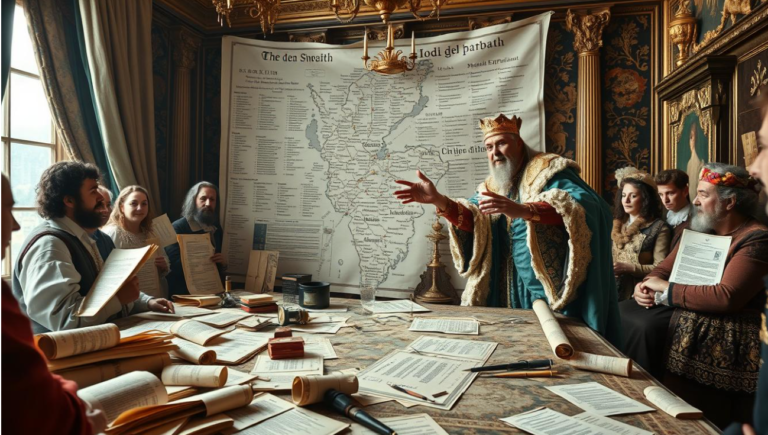The King Who Tried to Unlock God’s Language... And What We Can Learn!
You ever have one of those moments where you just know you’re onto something? You’ve got a plan, it seems foolproof, and then… it just doesn’t work out? Yeah, I’ve been there too, and trust me, it’s not a great feeling. But what if I told you this experience is something you share with a king—an actual king—who ruled a country and tried to unlock one of the biggest mysteries of all time?
The Adamic language is thought to be Adam’s first tongue in the Garden of Eden. It has fascinated many, including linguists, theologians, and philosophers. The search for this divine language has been ongoing, with many trying to find or bring back this perfect, divine way of speaking.

King Frederick I of Sweden had a crazy ambition. Back in the 18th century, Frederick tried to scientifically determine which language was spoken in the Garden of Eden—you know, the very first language of humanity. And how did he go about it? He had two infants raised in complete isolation to see what language they would naturally start speaking without any outside influence. Sounds bizarre, right? Long story short, the experiment didn’t go as planned. The infants never spoke a word. So, what’s the lesson here? Stick with me, because it’s deeper than you might think..
The King’s Bold Experiment
Okay, let’s rewind for a second. It’s 1731, and Frederick I is sitting on the Swedish throne. For what it’s worth, he wasn’t known for being the most successful king (that’s an understatement), but like many leaders of the time, he was obsessed with discovery and knowledge. He thought, “Why not use science to answer one of humanity’s oldest questions? What language did Adam and Eve speak?”
Now, if I had this thought, I’d probably rethink the whole experiment before actually going through with it. But Frederick? Oh no. He was that guy! He decided to raise these poor babies without any human contact, hoping they’d just magically start speaking the original language of the world.

Flashback to the Setup: What Went Wrong?
The idea was that without being taught Swedish, French, or any other language, the kids would naturally revert to the “pure” language of Eden. To be perfectly honest, the whole thing sounds like a bad idea. Who’d expect isolated infants to communicate in any language, let alone one from ancient texts?
Here’s the thing… the babies didn’t speak at all. In fact, the experiment was a massive failure. As far as I can tell, Frederick probably had one of those facepalm moments we all know too well. The kind where you’re like, “I can’t believe I really thought this would work!” I mean, it’s kind of like trying to solve a Rubik’s Cube without ever having seen one before.
What We Can Learn: Embrace Failure and Adapt
Now, if I’m being honest, it’s easy to laugh at Frederick’s failed experiment. But let’s take a second and think about it. Have you ever set your sights on something, only to realize it wasn’t going to pan out the way you expected? I know I have, more times than I’d like to admit.
The way I see it, this whole story isn’t just about a bizarre historical event. It’s about learning from failure. You see, Frederick had this grand idea, but when it didn’t work out, it wasn’t the end of the world. He went on, Sweden went on, and most importantly, history went on.
- Did You Know that this wasn’t the only time leaders tried extreme experiments.
- Reality Check: Infants need human interaction to learn language—no surprise Frederick’s experiment failed!
- Context: The 18th century was full of wild scientific experiments—some led to breakthroughs, others, not so much.
Motivational video of the day
Let’s be real here. We all have our “Frederick” moments—those times where we put our heart into something, only to have it completely flop. But instead of dwelling on it, we can use those moments to grow.
In a nutshell, what I’m trying to say is this: Failure is a part of life, but it doesn’t have to be the end. At the end of the day, it’s not about the experiment that went wrong, it’s about what we learn from it. So, what’s your next step after failure? That’s where the real growth happens.
I challenge you to think about the last time you failed and what it taught you. Share it in the comments, because your story might just inspire someone else to keep pushing through their own “Frederick” moment.







